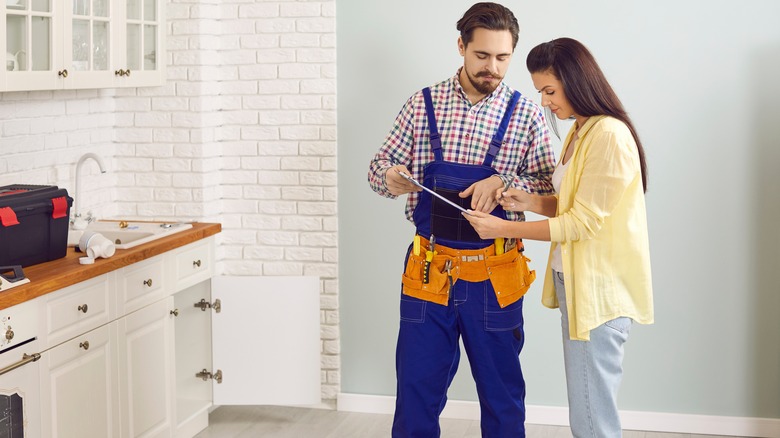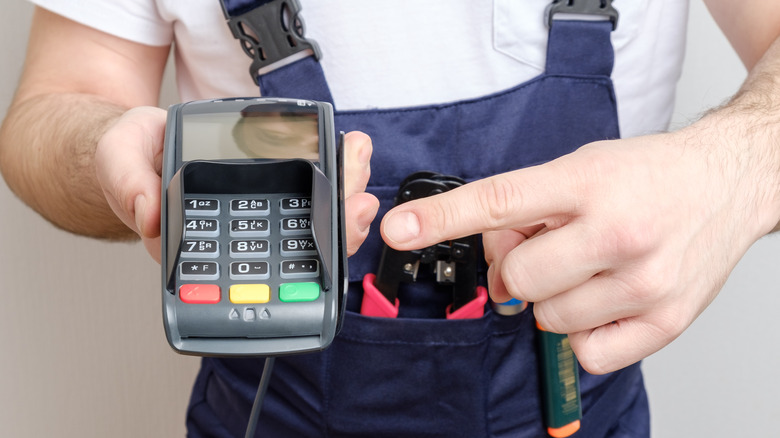How To Know If A Handyman Is Taking Advantage Of You
Back in the day, hiring a handyman, a plumber, or a company for any project whatsoever was easy peasy. But with the rise of scams among artisans and handymen, homeowners are on their toes, thinking, "Who's next?"! These kinds of scams do not exactly have a definite pattern. For some victims, the company or agent never existed, and for an elderly lady in Byhalia, Mississippi, the job wasn't completed despite having made the full payment, per Fox13. Chances are you've heard a similar story, or it's even happened to you; either way, you want nothing but to ensure it doesn't happen (again)! Earlier, we discussed the top ways to determine unscrupulous plumbers, and today, we'll be focusing on handymen.
Adding a room, renovating a basement, or doing some repairs around your home can be a big task. Finding a trustworthy contractor is an important first step. Scammers will promise to do the work but leave you and your home worse off than when you started. They may do shoddy work, damage your home, overcharge you, or take your money without performing services. So, can you tell when a handyman is trying to play a fast one on you? We've outlined five typical scams.
They solicit you
You may get a sudden, unsolicited email, text, or phone call from a company saying you have a contract with them. Before you agree to any service, ensure you research to see if the business or agency is a legitimate entity and call back the number posted on its website. If there isn't any website or social media page, that's a glaring red flag, via the Federal Trade Commission Consumer Advice. Also, please be wary of contractors knocking on your door, offering you a deal or an opportunity.
If someone claims to have just finished some repair work on a home nearby and gives you a discount because there's some leftover material, you're right to be wary. There is no logical reason for anyone to make an offer like that, and the material could even be stolen! Even if your home needs repairs or maintenance, please be reminded that all that glitters isn't gold. Many aren't even handymen; they're only fast-talking scam artists looking to take advantage of you. While they prefer to target the elderly, no one is safe from these criminals, insists Home Painters Toronto.
They want to shake on it immediately
According to Fraud Guides, the worst thing you can do is take a contractor's word for it. Always ask for a contract. Contract requirements vary by state; even if yours doesn't require a written agreement, ask for one. Better safe than sorry, yes? The contract is expected to list details such as the payment schedule, the contractor's license number, start and finish dates, address, and phone number. It is also important to get a copy of their insurance information and any work warranties. Do turn down any special offers that require you to act immediately without any paperwork.
Another vital part of the contract is a written statement of your right to cancel the contract within three business days. Also, make sure all blank spaces are filled in, and if possible, consider hiring an attorney to review and explain the contract to you if it seems vague. You can never be too careful, and loopholes are easy to miss, adds Nolo. The handyman should be willing to leave the contract with you so you can read it carefully on your own time. If anyone rushes you, tries to make you sign on the spot, or will not leave a copy for you to study, that's another huge red flag.
They want a lot of cash — and fast
An extensive renovation requires a thorough inspection to get an accurate, detailed estimate. A scammer will look around quickly and find an "attractive" price verbally or on a scrap piece of paper. They plan to convince you and secure a deposit you might never see again. You should never pay with cash in these situations. Only make payments by check or credit card; that way, you have a paper trail and a way to stop payment if necessary, explains Ask The Builder.
Also, don't pay the total amount for the project upfront. In some states, the amount of money a contractor can ask for as a down payment is limited. Contact your state or local consumer agency to determine the law in your area. And never make the final payment until the work is done and you're satisfied with it, via Arocon. And try not to rush — take your time and get multiple estimates. A written estimate should include a work description, materials, completion date, and price. Don't automatically choose the lowest bidder. And don't be afraid to ask for an explanation if there's a big difference among the estimates. It's your project, and you're the one calling the shots.
They use fear tactics
According to The Law Office of H. Benjamin Sharlin LLC, it's criminally easy for them to come up with some story like how the paint will rot your home, making a mountain out of a molehill to scare you into falling for their tricks. If you try to reason with them or say that you don't believe it, they blow up with their next line sounding something like, "You're not the professional here, I've been doing this for 10 years!" A reputable contractor, even if it is urgent, will not use fear to pressure you. Don't hesitate to walk away from any handyman, especially one who unexpectedly calls you or shows up at your door and claims you're in danger unless he makes immediate repairs.
If they threaten you, call the police to report your concerns. Your best bet to avoid this kind of scam altogether is never to accept an offer from someone peddling their services door-to-door, says Constructive Legal Solutions. Only allow licensed, bonded, highly recommended workers to do home repairs for you. Our last piece of advice is that you take the time to look into any references given. Always demand references and cross-check.
They lack professional credentials
As we've already said, do business with licensed, bonded, and insured contractors. Be careful if they can't offer any references from recent projects. Any honest handyman is always ecstatic to show off their earlier work. Always call those references and ask to see the completed project if possible. Double check the handyman's business addresses, phone number, and website and look for relevant information. It may seem like a lot of work, but it is worth it. An extra step you can take is to check with the local Home Builders Association and consumer protection officials to see if they have complaints against a contractor. You also can search online for the company's name with keywords like "scam," "review," or "complaint." Or, use online rating-review websites you trust to see what others say about the contractor.
The experts at LegalMatch explain that an unlicensed contractor can seem like an appealing option to you because they cost less than their licensed counterparts. But the reason they may cost less is, at least, in part, because unlicensed contractors avoid the expense of obtaining the proper licensing and liability insurance required to work in a particular state. This can open you to liability for legal issues resulting in financial losses. Now you know what to look out for; good luck!





